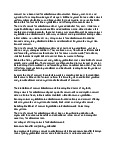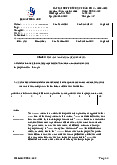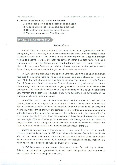



















Preview text:
UNIVERSITY OF ECONOMICS HO CHIMINHCITY
SCHOOL OF FOREIGN LANGUAGES FOR ECONOMICS READING (Module 5) Focus on Learning 1 UNIT 1: FIRST IMPRESSIONS
READING 1: IT’S NOT WHAT YOU KNOW Activity 1: Discussion
What do you understand by the expression 5It8s not what you know, but who you
know that counts6?Do you think networking is more important in some of these professions than others? Activity 2: Vocabulary Vocabulary Part of Definition and Example speech Bump into Aggregate Dilemma Manipulative Generate Apropos of nothing Strategist Networker Referral Accelerate Selfless Altruistic 2
It’s not what you know by Mike Southon
It is often said that your personal value is not what you know, but who you know. This is
powerful motivation for recent graduates to build their personal networks. But some of us
may conclude that we already have enough friends and contacts - the challenge is making the
best use of those that we already have.
Mathematics supports this argument. If you have been in business more than 20 years, you
probably have more than 150 close contacts - people you like and respect and would
recognise if you bumped into them out of their work context. If you add to this all the people
in their close networks, this aggregates to potentially more than 20,000 agreeable and interesting people.
It is not a problem to identify other networking prospects. We all have a drawer full of
business cards and often a large number of online connections. The dilemma is how to
successfully leverage existing contacts without appearing sleazy and manipulative.
The most important lesson to learn from the best-connected individuals is that little of their
networking activity is carried out with any specific business goal in mind. They concentrate
their effort on people they most like and who seem to like them back.
Even for the shyest individual, all that is required to leverage their network is to generate a list
of people whose company they enjoy and invite them to a private dinner. This would be
apropos of nothing in particular other than the pleasure of good company.
The tools for engineering a mutually successful outcome of such events are well explained by
one of Europe8s leading business networking strategists, Andy Lopata. His website explains
that connecting is not enough; it is important also to determine how well your contacts
understand what you do andthen how inspired they might be to provide a referral.
Lopata provides networking training and is always amazed to discover how few companies
have an effective referral strategy. One investment bank merely had a system for asking for
two referrals at the end of every meeting, regardless of whether they had built up any trust
with the client. Lopata says the chances of receiving a referral are greatly increased if they
understand exactly what you do and the problems you solve, have a high level of trust and
understand how you help people. Your chances of receiving a referral are increased if you are
also perceived to have a wider purpose to your working life.
Lopata recommends making a detailed assessment of your best contacts, the people they
know, their willingness to refer you to them and how you might inspire them to make 3
that introduction, for free. While some people offer direct financial rewards for referrals,
seasoned net- workers mostly make introductions on the basis that everyone gains a benefit,
including the prospect of referrals in return.
While high-level networking is primarily a face-to-face activity, Lopata agrees that online tools accelerate the process.
Expert networkers work on the basis that if you connect with your network on this mutually
beneficial basis, the financial rewards will flow. Successful networking should be selfless and
altruistic, giving referrals without remembering your simple favour, and receiving them
without forgetting their kind gift. Activity 3
What are your views on networking? To what extent do you agree with these
statements? Compare and discuss your answers.
strongly partially disagree agree agree
1. Networking just means socialising
with my colleagues and friends.
2. Networking is all about finding lots of useful business contacts.
3. Networking with business contacts is insincere and manipulative
4. Online social networking is as useful as face-to-face networking.
5. Networking involves getting lots of help from others. Activity 4
Read the article and compare the writer’s views on networking with your own. What
points does he make in relation to the five statements in activity 3? Activity 5
Read the article again and find words and expressions which mean the following.
1 .met someone you know when you were not expecting to (paragraph 2):
2. develop and use fully (paragraphs 3 and 5):
3. morally doubtful (paragraph 3):
4. not related to anything previously mentioned (paragraph 5):
5. when you recommend someone to another person for work (paragraphs 6 and 7):
6. move from one place to another in large amounts (paragraph 10): 4
7. caring about other people more than about yourself (two expressions) (paragraph 10): Activity 6
Look at these extracts from the article and indicate where the adverbs in brackets
should go. Sometimes more than one answer is possible.
1.We have enough friends and contacts. (already)
2.You have more than 150 close contacts, (probably)
3.The dilemma is how to leverage existing contacts. (successfully)
4.It is important to determine how well your contacts understand what you do.(also)
5.One investment bank had a system for asking for two referrals, (merely)
6.The chances of receiving a referral are increased if they understand what you do. (greatly, exactly)
7.High-level networking is a face-to-face activity.(primarily)
8.If you connect with your network on this beneficial basis, the financial rewards will flow, (mutually) Activity 7
Which of the networking strategies mentioned in the article do you find most useful? Which
do you think you will probably never use? Why?/ Whynot?
READING 2: BUSINESSES URGED TO KEEP INTERVIEW STANDARDS HIGH Activity 1: Discussion
What was your first impression of the organisation that you work for or the educational
institution that you study at?
Activity 2 : Vocabulary Vocabulary Part of Definition and Example speech Sexism Racist Butt in Encounter 5 Rate Hygiene Turn down Values On the line
Read this article from the Financial Times by John Willman and do the exercises that follow.
Businesses urged to keep interview standards high by John Willman
A third of job applicants come away from their interview with a bad impression of the
business, having faced questions unrelated to the job, poor interview preparation, sexism
and bad personal hygiene, a survey has found. In some cases, applicants complained of
racist questions and interviewers who were drunk.
Kevin Moran, a 29-year-old ITworker who went for a job in theCity, said he had been
surprised tofind it was held in a bar. "I had toshout over the noise, and one of the
interviewers kept going to the barwhen I was still speaking, butting inrudely and talking about
things thatwere completely unrelated," MrMoran said.
The survey of more than 2,000people, by Ipsos Mori for T-Mobile,found that applicants
judged apotential employer on their impressions of the working environmentand the
people employed. Theyexpected intelligent questionsrelated to the job, and a clear career-
progression plan. However, 40 percent of those who judged their interview experience as
bad said thequestions asked were nothing to dowith the job, while a third said
theinterviewer was unprepared. Morethan 31 per cent of those finding theencounter
disappointing had neverheard from the company again.
Among the complaints aboutinterviewers' behaviour by thosewho rated their encounter a
badexperience were lateness ( 18 percent), sexism (16 per cent) and badpersonal hygiene
(7 .5 per cent).Another complaint was that theinterviewer ate during the process(5.2 per 6
cent), while 11 of the 662disappointed applicants said theinterviewer was drunk. Almost
30per cent complained they had notbeen offered any refreshments,while 10 per cent said
the buildingwas dirty. As a result, almost halfthose who had experienced a badinterview
turned down the job whenit was offered.
"Interviewees are always underpressure to create a good firstimpression, but it seems that
businesses need to feel a bit of thatpressure as well," said Mark Martin,Human Resources
Director atT-Mobile UK. "Candidates arebeginning to place a company'sculture and values
at the top of theiragenda, so businesses need to thinkabout how these are expressed in
aninterview situation - or their reputation and brand could be onthe line." Activity 3
Read through the whole article. Matcheach of these headings (a-e) to a paragraph (1-5).
a) Businesses should think more about the firstimpressions that they create
b) Job candidates' bad first impressions of potentialemployers
c) One candidate's bad experiences
d) Particular complaints about job interviews
e) What people expect at interviews, and what manyactually get Activity 4
Relate what these interviewees said with thecomplaints in paragraphs 1 and 2.
a) 'The guy looked as though he hadn't shaved for aweek.'
b) 'He started slurring his words.'
c) 'She didn't really know anything about the job.'
d) 'They asked me, an experienced female executive,if I'd be willing to make tea for the boss!'
e) 'I was talking about my previous job in IT, andsuddenly he asked me which football team Isupport.'
f) 'It was crowded, and I couldn't hear a word hewas saying.'
g) 'They didn't let me finish my sentences when Iwas speaking.' Activity 5
Decide whether these statements aboutparagraphs 3 and 4 are true or false. The survey ... a) was carried out by Gallup.
b) covered more than 2,000 people.
c) found that interviewees were only interested intheir first job in the organisation, not 7 their latercareer there.
d) found that 40 per cent of those surveyed said thatthe questions at the job interview had nothing todo with the job.
e) found that about 33 per cent of those surveyedthought that the job interviewer had not
preparedproperly for the interview.
f) found that nearly a third of those who had had abad experience did not hear anything again fromthe company. Activity 6
Complete this table with words fromparagraphs 3 and 4 and related words. Verb Noun Survey …………………1 ………………..2 applicant, .......... 3 employ
employment,.......... 4, .......... 5………….. expect ……………….6 interview
…………..7,……………….8,………………..9
.........……………….. 10 encounter Activity 7
Match the nouns in activity 6 to these definitions.
a) an informal meeting, often between two or just afew people
b) an organisation that givespeople jobs c) someone who asks for a job
d) an occasion when someone is asked questions tosee if they are suitable for a job
e) the person who is asked the questions
f) the person who asks the questions
g) someone who works for an organisation
h) the act of asking for a job
i) the process of asking people about their opinionsand publishing the results j) what you think will happen Activity 8
Choose the best alternative (a, b or c) to completethese statements to reflect how the
expressionsin italic are used in paragraphs 4 and 5. 8
1. If you are disappointed, you feel unhappybecause something you ... a) expected did not happen. b) expected did happen. c) did not expect happened.
2. If you turn an offer down, you ... a) accept it. b) think about it. c) refuse it.
3. If you feel under pressure to do something, you feel ... a) pleased to do it. b) obliged to do it. c) worried about doing it.
4. A company's values are ...
a) its profits in the previous year. b) its physical assets.
c) the ideas, ways of behaving, etc. that it thinksare important.
5. If something is at the top of your agenda, it is the thing ...
a) that you think is most important. b) that is the most urgent.
c) in your diary that you have to do next.
6 .A company's reputation is people's ... a) good opinion of it.
b) opinion of it, whether good or bad. c) bad opinion of it.
7. If something such as your reputation is on the line, it is ... a) unchangeable. b) at risk. c) unpardonable. Activity 9 Discussion
Make a list of five key pieces of advice for each of a) interviewers, and b) interviewees in your country. 9
Training leaders to connect the dots by Don Sull
Firms navigating through turbulent markets face many challenges. One of the most
daunting, however, is how to develop their executives to manage effectively the range of
diverse threats and opportunities that volatile markets generate. And how to provide this
executive education in a way that offers good value for money and time.
The Chinese appliance maker Haier has risen from a nearly bankrupt collective enterprise
25 years ago to one of the most successful companies in China. Haier8s leaders have done
many things well, among them setting up a productive system of formal executive
education designed to produce versatile general managers that Haier can deploy against a
range of possible opportunities or threats.
When I visited Haier8s headquarters in Qingdao a few years ago, I interviewed the faculty
that ran their training centre, as well as many executives who participated in the
company8s programmes. Every Saturday morning, all Haier8s senior executives based in
China (totalling more than 70) attend a weekly training session. What training, you may
ask, could possibly justify half a day of Haier8s 70 most senior leaders every week?
Executives bring current problems or opportunities to these sessions and work in teams of six
to eight to discuss their individual challenges, explore possible solutions and discuss how
best to implement proposed changes. Faculty mixes executives from different functions,
business units and provinces to increase diversity of viewpoints and periodically rejigs the
teams to keep them fresh. During the week, executives experiment with proposed solutions
and report results back to their team-mates in later sessions, discuss what worked and did
not and explore ways to refine their actions.
This approach to executive education confers several benefits. First, it enables managers to
understand interactions between various parts of the organisation and spot opportunities
for productive collaboration. Second, ongoing exposure to the issues faced by different
parts of the business helps executives to connect the dots to understand Haier8s situation as
a whole, rather than looking at the market through the window of their own silo. Third, this
approach builds general management skills by helping executives hone the skills to
recognise and deal with a range of challenges.
These courses are anything but 7academic8, in the pejorative sense of 7divorced from practice8.
Faculty coaches provide tools and functional training closely linked to the challenges and
opportunities at hand. They also help the executives refine their action plan, devise
practical ways to track progress and facilitate mid-course correction. 12
A downturn provides an ideal opportunity for companies to rethink how they can get the
most value for their investment in executive development.
Activity 5: Complete these summary sentences. Read the article again if necessary. 1
Haier8s executive education involves training general managers to deal with ... 2
The writer of the article interviewed ... 3
More than 70 of Haier8s senior managers take part... 4
Executives on the programme discuss possible solutions to problems and then ... 5
Executive teams are mixed up regularly on the course to ... 6
Two of the main outcomes are that managers can better understand ... 7
Participants become more versatile as they learn to face different challenges ... 8
The coaches think of ways to check progress; they provide correction and ...
Activity 6: Match these words or phrases in italic from the article (1-10) to the correct definition (a-j).
1 periodically rejigs the teams
a) understanding something only from your (lines 45-46)
own position and not that of others
2 confers several benefits (line 54)
b) record the development of something or
3 spot opportunities (lines 57-58) someone over time
4 ongoing exposure to the issues
c) chance to experience new ideas and ways (lines 59-60) of looking at things
d) arranges in a different way
5 connect the dots (tines 61-62) ... e) too theoretical
6 looking ... through the window f ) brings/offers
of their own silo(lines 63-65)
g) notice something, especially when it is difficult to see
7 helping executives hone the skills (line 67) h) with a negative meaning
8 in the pejorative sense(line 71) i) improve/refine
9 divorced from practice(line 72)
j) realise that something is related to
10 track progress (line 78) something else
Activity 7: Discuss these questions.
1. How could you adapt Haier8s approach to training to make it work in your organisation?
What issues would you have to overcome?
2. How can colleagues learn from their team-mates rather than relying on a trainer? 13 Activity 8:
Why is the ability to emphasise important in business communication?
Find examples in the article for each of these techniques. 1 Using lists of three 2 Using superlative forms 3 Using two contrasting ideas 4
Using interesting or extreme adjectives 5
Emphasising a negative statement READING 2 Activity 1: Discussion
How are senior civil servants recruited and trained in your country?
Activity 2: Useful vocabulary Part of Definition and Example Words/Phrase speech bureaucracy conjure up red tape overturn ethics pursuit tailored reform fabric align genesis rank-and-file 14 comprise
Read this article from the Financial Times by Michael Bleby and do the exercises that follow.
Ivory Coast turns toHEC business school Michael Bleby
1. The image of bureaucracy in the developing world conjures up pictures of red tape
and demotivated, uncaring officials. But Charles KoffiDiby, Economy and Finance
Minister for Ivory Coast, is working to overturn that image. "We aim to strengthen ethics,
put in place a customer-oriented administration and put the human being back into the
heart of the administrative system," he says. "We would like to have a public
administration as competitive as the private sector."
2 In pursuit of this, MrDiby has introduced a corporate training programme for the 8,400
public servants in his Ministry of Economy and Finance. The tailored course, run by HEC
School of Management, Paris, is part of a wider programme of change that MrDiby is
promoting within his department. He hopes the HEC course will enable managers to bring about much-needed reforms.
3. Roger Dault, an affiliate professor at HEC who designed and runs the programme,
explains where the weaknesses lie. 'These people need to strengthen their managerial
competencies in different areas, like how to set up a strategy, how to implement it within
the fabric of the ministry as an organisationand how to align everybody behind this strategy."
4 Theprogramme had its genesis in 2007, when MrDiby, who has written a book on
public-sector management in Africa, met staff from HEC. "He told us: 'I want to have
real managers … people able to run an efficient administration,"' says Professor Dault. "He
said: 'Our citizens have needs and demands. We have to understand these needs and
demands and try to answer in the best possible way. I want an administration taking care of
its citizens and taking care of companies."'
Professor Dault saysMrDibyrealised that taking care of industry and investors would be
another factor of differentiation for Ivory Coast.
5 Theprogramme consists of two courses for executive and middle managers and a shorter
version for lower-level staff. The 10-day programme for executives, run over 10 months, 15
studies strategy and implementation, leadership, people management, ethics, customer needs and change management.
6 Participants also take part in a group project. HEC conducts 10 workshops for groups
of 20 executives at a time, meaning up to 200 are trained in a year. A similar course trains
middle managers in similar numbers, with more emphasis on operations. At the third level,
rank-and-file staff take part in one-day "mega-workshops" comprising 20 tables of 10
people. By conducting discussions on customer needs, followed by ethics, they encourage
officials to respond to the changes being introduced by their managers. Activity 3
Choose the correct alternative (a, b or c) to replace the expressions in italic from
paragraphs 1 and 2, keeping the closest meaning.
1 The image of bureaucracy in the developing world …
a) picture b) reputation c) icon
2 ... conjures up pictures of red tape and ...
a) evokes b) invokes c) provokes
3 ... demotivated, uncaring officials.
a) unmotivated b) disabused c) disinterested
4 But Charles KoffiDiby, Economy and Finance Minister for Ivory Coast, is working to overturn that image.
a) dismantle b) abolish c) change
5 'We aim to strengthen ethics, .. .'
a) power b) reinforce c) robust
6 In pursuit of this, MrDiby has introduced a corporate training programme .. a) To finalise this b) To action this c) To achieve this
7. The tailored course, run by HEC School of Management, Paris, is part of a wider programme
of change that MrIJiby is promoting within his department. a) specially cut b) specially designed c) specially conceived
Activity 4 : Decide whether these statements about paragraph 3 are true or false. Roger Dault ...
a) wrote the programme for Ivory Coast civil servants. 16
b) thinks that managerial skills of civil servants in Ivory Coast need to be improved.
c) thinks that strategy should be decided by business school professors.
d) believes that putting strategy into action should be part of the course.
e) thinks that strategy can be applied without involving low-ranking officials. Activity 5
Find the five groups of people/organisationsmentioned in paragraph 4. Which groups
arereferred to by more than one expression?
Activity 6 :Match these areas mentioned in paragraph 5 (1-6) to a related idea (a-f). 1 strategy formulation 2 strategy implementation
3 leadership/people management 4 ethics 5 customer needs 6 change management
a) Asking citizens what they want b) Behaving in a moral way
c) Inspiring civil servants to work to the best of their ability
d) Persuading people to do things in new ways
e) Sitting down to discuss goals over the next 10 or 20 years
f) Thinking about how the grand plan can be put into practice Activity 7 In paragraph 6, find
a) a verb (used twice here) that can also be used to talk about leading musicians.
b) a prefix that means 'very big'.
c) a noun that can also refer to medical procedures.
d) an adjectival expression used to refer to the ordinary members of an organisation.
e) a noun that can also refer to a place where things are made on a small scale.
f) a verb used to talk about reacting to events.
g) a verb (used in its -ing form here) meaning 'contain'. Activity 8: Discussion
Imagine that you are Head of Training for your organisation, or one you would like to
work for. Give the outlines of an ideal management course that you would like to run for
its managers, using professors from a top management school. 17 UNIT 3: ENERGY
READING 1: THE DANGER OF LOSING TOUCH WITH REALITY
Activity 1: Discuss these statements about energy, deciding whether each one is True
(T), False (F) or you don’t know (DK). Give reasons for your answers.
1. A carbon tax on industry could help to reduce greenhouse gas emissions.
2. Changing to a low-carbon world can be achieved quite quickly.
3. Rapid growth of the world8s population will soon increase demand for energy.
4. Most forms of alternative energy are easier to transport, store and use than oil and gas.
5. Private companies need government support to make technological advances.
6. Oil and gas prices will increase in the future.
Activity 2: Useful Vocabulary Word/Phrase Part of Definition and Example speech curb impose concrete die-hard wear off feasible stifle finite
Activity 3: Read the article and, in pairs, compare your answers to Activity 1 with Helge Lund’s views. 18
The danger of losing touch with reality Ed Crooks
Politicians often underestimate the massive challenge of cutting greenhouse gas emissions by
moving away from fossil fuels, according to Helge Lund, Chief Executive of StatoilHydro,
Norway8s national oil and gas company, who is an adviser to the United Nations Secretary- General on energy.
Mr Lund is far from the stereotype of the die-hard oilman. He believes it is important to
engage with the debate over climate change, and is the only oil company representative on
the group advising the UN Secretary-General, on energy.
Norway has a good record for curbing greenhouse gas emissions from its oil industry,
having been one of the first countries to impose a carbon tax, in 1991. Statoil is a pioneer of
storing carbon dioxide underground, with projects in Norway and Algeria.
Mr Lund accepts that, in the future, his customers will use less of the oil and gas that his
company produces. Yet even he is concerned that politicians are in danger of losing touch
with reality in their push for a low- carbon world. Weaning the world off oil and gas, he
says, will be harder than many people realise. m
7Govern ents are moving away from the
energy source that our entire civilisation is built on: hydrocarbons. That is not an easy task,8
he says. 7It is very important that the debate is based on energy realities.8
The first of those realities is demography. By 2050, the world8s population is set to grow to 9
billion, from about 6.8 billion today, while economic development lifts hundreds of millions
out of poverty, enabling them to buy cars and fridges and air conditioning. That creates
massive upward pressure on global energy demand which, given 7business as usual8 policies,
will rise by 45 per cent by 2030, according to the International Energy Agency, the rich countries8 watchdog.
The second is the effectiveness of hydrocarbons oi 4
l and gas - as energy sources that can be
easily extracted, transported, stored and used. Few of today8s alternatives offer anything like
as attractive a combination of characteristics. Mr Lund8s conclusion: 7You can see that
planning to move away quickly from hydrocarbons is unrealistic.8
He does not deny the science of climate change, and says there is an 7urgent8 need to respond
to it. But he does want to stop responses that he thinks will be counter-productive. 7The
debate is sometimes too simplistic, and overstates the opportunity for quickly changing to a
low-carbon economy,8 he says. 7If we start the discussion on an unrealistic basis, we are less
likely to make any real progress.8 The danger he highlights is of politically driven support for 19




